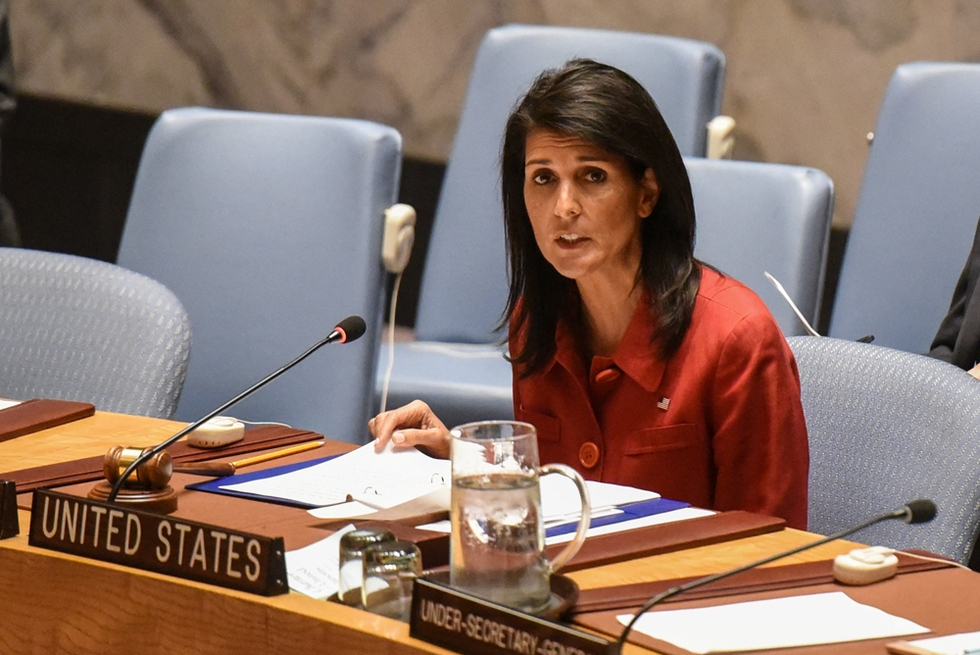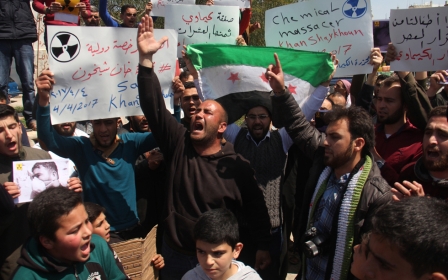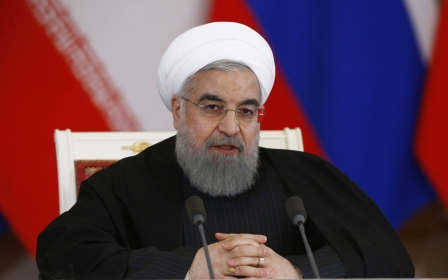'Regime change... is going to happen': US on Assad's future in Syria

Syria will not know peace under Bashar al-Assad, the US ambassador to the UN has said in comments that signal Washington's policy is moving towards regime change following a deadly chemical attack in Idlib province.
Nikki Haley told CNN's "State of the Union" programme on Sunday "there's not any sort of option where a political solution is going to happen with Assad at the head of the regime".
"If you look at his actions, if you look at the situation, it's going to be hard to see a government that's peaceful and stable with Assad," said Haley.
"Regime change is something that we think is going to happen."
Haley reiterated the comments of Rex Tillerson, the US secretary of state, who insisted that defeating the Islamic State (IS) group was the priority for the White House.
"It's important that we keep our priorities straight," said Tillerson. "Once the [IS] threat has been reduced or eliminated, I think we can turn our attention directly to stabilising the situation in Syria."
Haley's words, however, came a day after she said Washington was ready to take additional action after a US cruise missile attack on a Syrian air base in Homs.
The US says the base was used in the Syrian attack in Khan Sheikhun in rebel-held Idlib province, whose victims included 27 children.
Medical workers and experts say victims of the the chemical release displayed symptoms consistent with a potent nerve agent, possibly Sarin.
The US president, Donald Trump, has signalled a dramatic about-turn toward Assad, who many in the international community hold responsible for Tuesday's horrific events.
If confirmed to be a chemical attack, this would be among the worst such incidents in Syria's civil war, which has killed more than 320,000 people since it began in March 2011.
Syria officially relinquished its chemical arsenal and signed the Chemical Weapons Convention in 2013 to avert military action after it was accused of an attack outside Damascus that killed hundreds.
But there have been repeated allegations of chemical weapons use since.
Assad's principal backer, Russia, has said the chemical release in Khan Sheikhun was the result of Syrian jets bombing a rebel weapons store. Rebels have denied they own or can produce nerve agents like Sarin.
The Russians were never targeted in this particular strike
- Rex Tillerson, US secretary of state
Tillerson insisted he had no concerns about possible Russian retaliation after the US attack on the airbase.
"The Russians were never targeted in this particular strike," Tillerson said.
"It was a very deliberate, very proportional, and very targeted strike undertaken in response to the chemical weapons attack. And Russia was never part of the targeting."
Britain's defence secretary, Michael Fallon, on Sunday criticised Russia's support of Assad, describing the chemical attack as a war crime that happened "on their watch".
"By proxy Russia is responsible for every civilian death last week," Fallon wrote in the Sunday Times newspaper.
Russia meanwhile said a decision by the British foreign secretary to cancel a visit to Moscow later this month showed a lack of understanding of events in Syria.
Boris Johnson cancelled the visit, scheduled for 10 April, on Saturday, saying events in Syria had changed priorities.
The Russian foreign ministry said the decision showed once more that there was little to gain from talking to Britain, which it said had no real influence over world affairs.
New MEE newsletter: Jerusalem Dispatch
Sign up to get the latest insights and analysis on Israel-Palestine, alongside Turkey Unpacked and other MEE newsletters
Middle East Eye delivers independent and unrivalled coverage and analysis of the Middle East, North Africa and beyond. To learn more about republishing this content and the associated fees, please fill out this form. More about MEE can be found here.




